Thomas Birks Studies in Biblical Prophecy (9 vols.)
Digital Logos Edition
Overview
Investigate biblical prophecy with Anglican minister and Cambridge scholar Thomas Rawson Birks. In these classic volumes you’ll find Birks’ insights and exposition on the prophecies found in Isaiah, Daniel, and Revelation.
Not one to shy away from controversial topics, Birks wrote and studied extensively on biblical prophecy and the Apocalypse. Of prophecies he writes, “they serve to link into harmonious union the precepts of the Law and the promises of the gospel. They give a freedom and dignity to the obedience of the Christian, by admitting him to a glimpse of the counsels of the most high, and raising him to the high honor of being a fellow-worker with God. They shield the grace of the gospel from licentious abuse, by exhibiting the severest warnings of judgment to those who corrupt and pervert its sacred privileges.”
Now you can explore the complex world of biblical prophecy with Birks’ writings, and acquaint yourself with nineteenth-century Apocalypse studies. Gain perspective as Birks addresses the writing of many of his contemporaries, and puts forth his own ideas on these sensitive subjects. Included are his historical expositions of the four kingdoms and later visions of Daniel, commentary and a revised translation of Isaiah, and discussion of the prophecy of Revelation. Birks also speaks into some challenging aspects of Christian belief—discussing controversial points within creation, the fall, redemption, and judgment.
In the Logos editions, these valuable volumes are enhanced by amazing functionality. Scripture citations link directly to English translations, and important terms link to dictionaries, encyclopedias, and a wealth of other resources in your digital library. Perform powerful searches to find exactly what you’re looking for. Take the discussion with you using tablet and mobile apps. With Logos Bible Software, the most efficient and comprehensive research tools are in one place, so you get the most out of your study.
This title is included in the following collections
You can save when you purchase this product as part of a collection.
Logos 7 Anglican Diamond Legac...
$2,999.99$2,999.99Logos 7 Anglican Portfolio Leg...
$4,749.99$4,749.99Logos 8 Ultimate Legacy Librar...
$21,749.99$21,749.99Logos 9 Ultimate Legacy Librar...
$24,999.99$24,999.99

Key Features
- Commentary and a revised translation of Isaiah
- Exposition of the prophecies of Daniel and Revelation
- Window into nineteenth-century Apocalypse studies
Individual Titles
- Commentary on the Book of Isaiah: Critical, Historical, and Prophetical
- The Mystery of Providence: Or, the Prophetic History of the Decline and Fall of the Roman Empire
- Outlines of Unfulfilled Prophecy: Being An Inquiry Into the Scripture Testimony Respecting the “Good Things To Come”
- Thoughts on the Times and Seasons of Sacred Prophecy
- The Four Prophetic Empires and the Kingdom of the Messiah: Being An Exposition of the First Two Visions of Daniel
- The Two Later Visions of Daniel: Historically Explained
- The Victory of Divine Goodness
- The Difficulties of Belief: In Connection with the Creation and the Fall, Redemption and Judgment
- First Elements of Sacred Prophecy: Including an Examination of Several Recent Expositions and of the Year-Day Theory
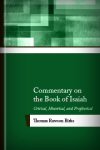
Explore Thomas Rawson Birks’ commentary on Isaiah alongside the text of his revised English translation of the book. He provides exposition of the Scripture, and seeks to unfold “the structure of the book of Isaiah, and the mutual relation of its parts, and thus to confirm the genuineness and unity of the whole prophecy.” His object is also to unfold the “relation between Isaiah’s successive visions and the circumstances out of which they arose.” He also provides a number of appendixes on various related subjects.
Contents:
- Introduction
- The Nature of Scripture Prophecy
- The Books of the Prophets
- The Life and Times of Isaiah
- Structure of the Book of Isaiah
- First Series of Visions
- Commentary
- Appendixes
- On the Genuineness of the Later Prophecies
- Structure of the Later Prophecies
- The Assyrian Reigns in Isaiah
- The Prophecy of Immanuel
- The Historical Groundwork of the Burdens
- The Assyrian Overthrow
- The Controversy with Gentile Idolatry
- The Internal Evidence of the Isaian Authorship of Ch. LV–LXVI
- On Ch. LXVI, and the Events of the Last Times
- On Ch. LXVI 22–24, and the Doctrine of Eternal Judgment
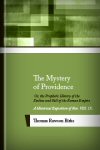
Birks offers a historical exposition of Revelation 8 and 9.
Contents:
- Introduction
- The Season of Intersession
- The Warning and Preparation
- The First Trumpet
- The Pause of Judgment
- The Second Trumpet
- The Third Trumpet
- The Fourth Trumpet
- The Warning in Mid-Heaven
- Rise and Progress of the Locusts
- The Continuance of the Locust Woe
- The Interval of the Two Woes
- The Meaning of the Emblems
- The Days of Chivalry
- The Description of the Horsemen
- The Sins of Christendom
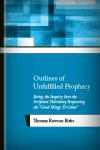
Thomas Birks seeks to “unfold in logical order the hopes which the word of God sets before us of the ‘good things to come’ and at the same time to examine chief objections which have been lately urged, especially by the Rev. David Brown, against the doctrine of the premillennial advent of our Lord, and of his personal reign over the earth in glorified humanity.” He notes, “I have purposely forborne all amplification of the doctrines here unfolded, and practical reflections on their importance and spiritual consequences, and have sought to make it simply a manual of Scripture evidence.”
Contents:
- Introduction
- On the Second Coming of the Lord
- On the Period of the Second Advent
- The Millennium
- Objections against the Literal Interpretation
- The Millennium and the Church of Christ
- The Dispensation of Grace
- The Judgment of the Dead
- The Kingdom of Christ
- The Order of the Resurrection
- The Order of the Judgment
- The New Heavens and Earth
- The Millennial Restoration of Israel—The Prophecies of Isaiah
- Israel’s Restoration—The Later Prophets
- Difficulties and Objections
- The Eternal Kingdom
- The Vision of the New Jerusalem
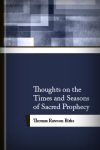
Finished by Thomas Birks’ son after he was taken ill, this volume contains four sections restating and expanding upon his ideas about the structure of Apocalypse and prophecy. Birks found his ideas and views misrepresented in Edward Bishop Elliott’s Horae Apocalypticae and set out to establish a correct understanding of his thinking on the Apocalypse.
Contents:
- Structure of the Apocalypse
- The Calendar of Prophecy
- Principles of Prophetic Interpretation
- Progressive Knowledge of Times and Seasons
- The World’s Great Sabbath
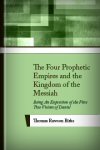
Explore Birks’ exposition of the four kingdoms described in Daniel. He comments that he aims to “impress the mind of the reader with a vivid sense of the reality of Divine Providence, based firmly on a strict and logical interpretation of the visions, and then to clothe the bare outline with a refreshing variety of spiritual meditations.”
Contents:
- General Introduction
- On the Four Empires in General
- On the Empire of Babylon
- On the Empires of Persia and Greece
- On the Undivided Fourth Empire
- The Fourth Prophetic Empire—First Stage of Division
- The Fourth Prophetic Empire—Later Stage of Division
- On the Ten Kings
- On the Moral Aspect of the Ten Kings
- The Rise of the Little Horn
- The Character of the Little Horn—The Papal Supremacy
- The Character of the Little Horn—The Papal Persecution
- On the Moral Aspect of the Vision of the Little Horn
- The Spiritual Lessons of the Prophetic History
- On the Millennium
- On the New Heavens and Earth
- On the Time of the Second Advent
- The Destruction of the Great Image
- The Kingdom of the Son of Man
- Concluding Reflections
- On the Four Empires in Connection with Sacred Chronology
- On the First Resurrection
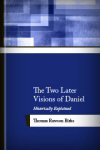
Birks continues his historical exposition of Daniel’s prophecies which he started in The Four Prophetic Empires, with a discussion “more strictly confined to the actual details of the prophetic history.” He discusses the two later visions of Daniel.
Contents:
- Introduction
- The Conquests of Cyrus
- On Alexander and His Successors
- The Three Successors of Cyrus
- The Expedition of Xerxes
- Ptolemy and Seleucus Nicator
- Antiochus Theus and Ptolemy Philadelphus
- Selecus Ceraunus and Aniochus the Great
- Antiochus the Great and the Jews
- Antiochus the Great and the Romans
- Seleucus Philopator and Antiochus Epiphanes
- On the Percursive Fulfilment of Prophecy—The Desolation of Antiochus
- The Proper Fulfilment of the Little Horn
- The Eastern Empire of Rome
- The Abomination of Desolation
- The Willful King
- The History of the Willful King
- The Warfare of the Latter Days
- The Latest Conflicts in the East
- The Historical Reality of Prophecy
- The Political Worth of Daniel’s Visions
- The Historical Review of the Prophecy
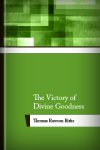
In this volume Birks compiles a number of different fragments of his writing, especially concerned with the concepts of atonement and judgment to come. The text’s three main sections are “Letters to an Inquirer on Various Doctrines of Scripture,” “Notes on Coleridge’s Confessions of an Inquiring Spirit,” and “Thoughts on the Nature of the Atonement and of Eternal Judgment.”
Contents:
- Letter I: Introductory
- Letter II: Life and Death—Credulity and Skepticism
- Letter III: The History of the Flood
- Letter IV: The Canaanites
- Letter V: On Future Punishment
- Letter VI: The State of the Departed
- Letter VII: Mutual Recognition
- Notes on Coleridge’s Confessions of an Inquiring Spirit
- The Nature and Effects of the Atonement
- On Eternal Judgment
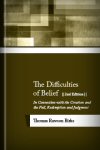
Thomas Birks discusses some of the challenging aspects of Christian belief about creation, free will, sin, redemption, and judgment. As Birks states in the preface, the object of his text is to “remove some of those difficulties which have often haunted thoughtful and inquiring minds, when they reflect on the deeper truths and more solemn aspects of religion, both natural and revealed. . . . The aim of these pages is not to awaken the sense of difficulties in [the readers’] minds, but to relieve the depth of these shadows, where they have been felt in their chilling and depressing power. In the hope that the views here partly unfolded, and which are not hastily entertained may be to some weary spirits like a streak of morning light upon the distant mountains when the gloom of night is passing away, they are committed to the blessing of the true Fountain of all wisdom.”
Contents:
- On the Knowledge of God
- On the Power of God
- On the Nature of Evil
- On the Creation of Free Agents
- On Temptation in Free Agents
- On the Creation and Fall of Angels
- On the Creation and Fall of Man
- On the Permission of Satanic Temptation
- On Original Sin
- On Original Sin, Continued
- On the Incarnation
- On the Nature of the Atonement
- On Eternal Judgment
- Objections and Explanations
- On Eternal Judgment, Concluded
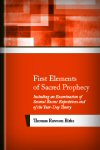
Birk exposits the “first elements” of the symbolical prophecies of Daniel and John, the prophecy of Jesus, and a few predictions in the writings of Paul. He states his object as being “to secure firm footing at every step, and, avoiding more doubtful questions, to establish the first elements of prophetic truth on clear and logical grounds of Scripture evidence and solid reason.” He helps readers unpack these kinds of prophecies, that “refer more immediately to the Church of Christ, in its actual state and present dangers,” and “endeavored to remove some of those prejudices and objections, which have lately been repeated in various forms, and have tended to obscure even the simplest conclusions that had been previously drawn from the inspired predictions.” Birks designs his work to serve as an introduction to works on these prophecies from writers such as Mede, Daubauz, Cressener, and Faber.
Contents:
- Arguments Alleged Against the Received Interpretations
- Presumptions Alleged for the Futurist Theories
- On the Four Empires
- The Vision of the Ram and the He-Goat (Daniel VIII)
- Supplementary Objections
- The Prophecy of the Scripture of Truth (Dan. XI. 1–20)
- The Seventy Weeks
- General Conclusions from the Visions of Daniel
- The Prophecy of the Fall of Jerusalem
- The General Design of the Apocalypse—Futurist Objections to Its Fulfilment
- The General Scope of the Apocalypse—Direct Arguments
- The Year-Day Theory—The Question Stated
- The Year-Day Theory—The Numbers in Daniel
- The Year-Day Theory—The Numbers in the Apocalypse
- The Year-Day Theory Concluded
- Concluding Observations
Product Details
- Title: Thomas Birks Studies in Biblical Prophecy
- Author: Thomas Rawson Birks
- Volumes: 9
- Pages: 3,131
About Thomas R. Birks
Thomas Rawson Birks (1810–1883) was an Anglican priest and Knightbridge Professor of Moral Philosophy at Cambridge. He also wrote extensively, authoring numerous theological works, many of which sparked discussion and debate. Some of his books include Essay on the Right Estimation of Manuscript Evidence, The Exodus of Israel, Scripture Doctrine of Creation, The Philosophy of Human Responsibility, and Modern Physical Fatalism and the Doctrine of Evolution.